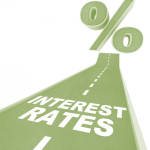Follow Me
Subscribe to My Weekly Newsletter
How to Prepare for Rising Interest Rates
- Aug
- 11
- Posted by Bregman Properties
- Posted in Blog, Monday Morning Update
Five Things to Know About Rising Interest Rates
 My First House: My wife and I purchased our first house in 1996. We thought that we hit the jackpot getting a mortgage interest rate of 6.25%! We sold that house six years later, for more than twice the price that we paid for it, and purchase our new house using the appreciated value as the down payment.
My First House: My wife and I purchased our first house in 1996. We thought that we hit the jackpot getting a mortgage interest rate of 6.25%! We sold that house six years later, for more than twice the price that we paid for it, and purchase our new house using the appreciated value as the down payment.
Lesson Learned: The lesson that I learned is the importance of getting into the real estate market at whatever level you can afford.
Some Must Sell, Others Must Buy: Regardless of where the mortgage interest rate is at any point in time, every piece of real estate must be owned by someone. When it is time to buy or sell your house the interest rate should not be the only deciding factor.
The Bottom Line:
- The best time to sell your house is when you want to move to a new location or when you want to move to a larger or a smaller house.
- The best time to buy your house is when you want to move to a new location or when you want to move to a larger or a smaller house.
Want to Know what your house is worth:Click Here
Let Me Help You Find Your new home: Click Here
Bregman Properties Appreciates Your Referrals
Want to know what your house is worth? Click Here
Are you looking for a new home? Click Here
Read Client Reviews: Click Here
– See more at: https://bregmanproperties.com/2013/07/28/negotiate-well/#sthash.7Fd0CtNr.dpuf
Want to know what your house is worth? Click Here
Are you looking for a new home? Click Here
Read Client Reviews: Click Here
– See more at: https://bregmanproperties.com/2013/07/28/negotiate-well/#sthash.7Fd0CtNr.dpuf
Five Things to Know About Rising Interest Rates
After years of decline to rock-bottom levels, interest rates are on the rise. The average rate for a 30-year mortgage was recently 4.35%, more than a point above the 2012 low of 3.3%.
Whether you’re buying, selling or refinancing a home, here’s how to navigate the new environment.
1. No more record rates, but still cheap loans
If the economy continues to improve as anticipated, interest rates will keep inching up. Freddie Mac expects the 30-year to reach 4.7% by the end of 2014. IHS Global Insight forecasts that interest rates won’t hit 6% until 2017. (I was thrilled with a rate of 6.25% when I purchased my first house. The current rates are still at historically low levels! – TB)
2. The refi window is starting to close
The rate bump is already cooling off refis, but most homeowners with the equity and stellar credit to refinance have already done so.
If you didn’t have enough equity to qualify, check again — rising prices pushed 850,000 homes into the black in the first quarter, according to CoreLogic. Plus, the recovery may lead lenders to loosen up. (If you did not have enough equity to refi your higher rate mortgage last year, perhaps you do now. Click Here and ask me to prepare a Comparative Market Analysis (CMA) for your house. It is very possible that you may now have enough equity to refinance to a lower rate. – TB)
The average credit score for an approved mortgage has been 761, says the National Association of Realtors, up from the normal 720.
3. Higher interest rates won’t scuttle the housing recovery
At worst, this turnaround will only dampen the pace of growth, says IHS U.S. economist Patrick Newport. A healthier economy is what’s boosting prices. Interest rates would have to rise sharply to make a mark. “Going up three percentage points would be a major wet blanket,” says Bob Walters, chief economist of Quicken Loans.
With prices rising, sellers can be patient. For buyers, mortgages are still historically cheap.
4. Once you’re ready to buy, lock in
To avoid any short-term spikes, Washington, D.C., mortgage banker Frank Donnelly recommends locking in as soon as you can (typically when you sign a contract).
Most lenders won’t charge for a 45-or 60-day rate lock. Pay for a 90- or 120-day lock only if deals close slowly where you live (ask your lender); the typical cost is a quarter of a point per 30 days. With a float-down option, you’ll pay less when rates fall at least a quarter point. Skip that add-on unless it’s free.
5. Fixed loans usually beat adjustables
You may be eyeing adjustables, which are up less than fixed loans. An ARM is the better call only if you plan to own your home for a short time.
“When you need five or six years, you might save with an adjustable,” says Keith Gumbinger of the research firm HSH.com. (If you plan to own your house more than six years you will typically be better off looking at a 30 year fixed loan mortgage – TB)
Click Here to play with different time and rate scenarios on a simple mortgage calculator.
 818-915-3360
818-915-3360
